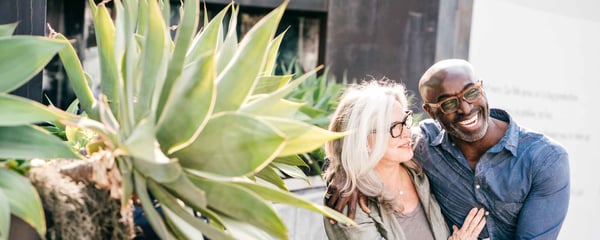What is an annuity?
An annuity gives you a regular, guaranteed income when you retire. You can buy one once you’re 55 (or 57 from April 2028), using money from your pension pot. Depending on the type of annuity you go for and the product options you choose, you can get a guaranteed income that:
- Lasts for the rest of your life
- Rises over the life of your annuity
- Goes to someone else when you die
Once you’ve set up an annuity you can’t make any changes to it.

What does annuity mean?
Once an annuity's up and running you'll start getting regular, guaranteed payments. You agree how much those payments will be when you set up your annuity. Different providers will offer different annuity rates, so it’s always worth shopping around.
But the meaning of annuity is more than just financial. Because of those guaranteed payments, the real annuity meaning is often just… peace of mind. In this article we'll be looking at how a lifetime annuity works. You could also consider a fixed-term annuity, which works a bit differently.

Barry: Hi, I'm Barry, and I'm coming up to that real pivotal age in life where I'm thinking about retirement and I've been doing a bit of research, but I really don't know quite the best way to go. So, I'm really fortunate to be joined by John, Legal & General's annuity expert, who's going to help me out a bit today. So, John, like I say, I'm approaching retirement
Barry: I want to look at the best options available for me. I looked at the annuity calculator and an annuity income looked good. But what is an annuity and how does it work?
John: Well first of all, Barry, well done for using the annuity calculator. That's a great start to looking at your options and deciding how to best approach retirement. An annuity, it's a product that will give you a guaranteed income. And the way you purchase it is with your pension savings. You give us a lump sum of your pension savings and then we will guarantee the income over a period of time, now that period of time can be for your lifetime, or it can be for a set period of time.
Barry: Okay, that sounds good, but is there more than one type of annuity?
John: There's actually a number of annuities and options you can look at, Barry. Probably the most common one is the lifetime annuity and as it says in its name, you take this out for the whole of your life, and we guarantee that we will pay your income for the whole of your life, regardless of how long you live for.
John: So if you live to 120, we'll still be paying out your income at that time. Conversely to that, there's what's called a fixed term annuity and that's where we pay it for a set amount of time that you choose. And this can sort of be used for what's called a bridging income. So, a typical example of that is if you were to maybe reduce your hours at work, but you want to maintain a similar amount of income, you don't want your income to reduce, then you can take the fixed term annuity out for the period before you maybe hit full retirement, and then you fully stop working. Alongside those you can have options to take the annuity out with a loved one. Okay. And when you do that, it means that we guarantee that when you die that the income will continue to be paid to your loved one after that.
John: So that can give peace of mind for you and for your loved one in your family as well. And finally, there's the enhanced annuity. Now, if you have certain medical conditions or lifestyle factors. So, for example, you smoke or you drink heavily, then we could offer you a higher amount of income, as a result so it would enhance the annuity.
Barry: I certainly hope to live to 120 years. That'd be nice, wouldn't it. Yeah, yeah. So, for someone like me what are the key benefits?
John: To reiterate it's the guaranteed payments is the main benefits, Barry. You will have peace of mind through the whole of your retirement, you will continue to receive income. But that's the massive benefit, they're well-established products in the marketplace. They've been around for a while and it's something that's going to continue to be around for a while.
Barry: I certainly like that they're established. But what are the other key things I need to be aware of?
John: When you take out annuity, Barry, there will be a number of options you can have to, what we call shape the annuity and make it personal to you. So you need to be aware of your personal goals, your personal circumstances, and make sure the annuity is going to be fit for purpose for you, which you will be able to do.
John: But you just need to be aware of that fact. Also, if you were to die soon after taking the annuity out, then there's chance you will get back less than you invested. And also, once you've set up your annuity, Barry, you won't be able to make any changes to it. Okay. So, that's why you need to be sure that it's right for you.
Barry: So when can I take this out and because it sounds like there's lots of options, would I need to speak to a financial advisor?
John: So you can take out an annuity from age 55, although in 2028, April 2028, that is going to rise to 57 as the minimum age you can take one out. As for a financial advisor, you don't have to use a financial advisor, Barry. But we would recommend you use one if you are unsure of what to do and if the options are proving too confusing for you, then that could be a route to go down.
John: But there's also the government's Pension Wise service that you can use. And they will give you unbiased guidance and help you see your options as well. And that's a free service that the government provide. But you can apply for annuity directly with us. You can do that online through our website. And as part of that quote journey we will tell you if you can get better income elsewhere.
John: Okay. So different providers provide different levels of income. We don't all provide the same amount. And we also have the annuity ready service, which will allow you to find out who is providing the best income. And they will actually help you apply for that as well. So you can achieve the best income, even where that income isn't provided by Legal & General.
Barry: It's brilliant that you tell me if there's a different rate elsewhere, do I have to pay for that?
John: No, we won't charge you anything extra for that service. So we will just let you know where the best rate can be found and help you apply for that.
Barry: Crikey, right, that's amazing. Thank you for all your time today, John. It's been really helpful.
John: Oh, you're very welcome, Barry. Thank you. Visit legal&general.com/annuities for information and helpful guides. And also if you liked the video, remember to like, share and subscribe.
Is an annuity a good idea?
As with any financial product, whether or not an annuity is a good idea depends on your personal circumstances and goals. If you’re the right age and looking for a guaranteed income, an annuity could be right for you. But if you want more flexibility it could be better to go for another choice, like drawdown. Our Annuity vs drawdown article compares the two in more detail.
We’ve put together a list of pros and cons for lifetime annuities below.
Is an annuity a good idea?
An annuity can be a good idea because:
- Annuity rates have risen in the last few years, making them more attractive
- They’re well-established products giving a completely reliable guaranteed income
- You can choose between different annuity benefits and providers
- Make sure you shop around before buying!
What are the downsides of annuities?
Annuity downsides can include:
- Once you’ve made your choices and set up your annuity, you can’t change it
- When you die your annuity will stop paying out, unless you choose to:
- switch some or all of your payments to a loved one
- pay out a lump sum to them
- Annuity rates vary and other retirement income products might pay out more
And of course if you’re worried about annuity downsides, it’s very important to shop around and make sure you fully understand your other retirement income choices. You should only buy an annuity once you’re absolutely sure that it’s the right choice for you.
What happens to an annuity when you die?
When you die, annuities usually just stop paying out. But when you’re setting up your annuity you might be able to ask your provider to make other arrangements. After you die, they could:
- Switch some or all of your payments to a loved one
- Pay out a lump sum to them
What should I do next?
This article is very much a starter for ten. To dig deeper, you can:
- Get quotes from across the whole market at our AnnuityReady site
- Get free guidance at the Government’s Pension Wise site
- Find an independent financial adviser at the Unbiased site
FAQs
HMRC treats any annuity income you receive as part of your taxable income, which also includes your State Pension. Any money you get above your personal allowance is taxable. The amount of tax you pay will depend on your personal circumstances and may change in the future.
People often talk about annuities meaning just a lifetime annuity. In fact, you can choose between many different types of annuity. Each has its own specific benefits – the full list is:
- Lifetime annuities
- Fixed term annuities
- Joint lifetime annuities
- Enhanced annuities
- Deferred annuities
- Variable annuities
- Immediate needs annuities
- Purchased life annuities
A pension is a tax-efficient way of investing for your retirement, often with the help of your employer or the government. As you invest in your pension you build up your pension pot.
When the time comes to retire, you can spend some or all of your pension pot on an annuity. An annuity gives you a guaranteed income for the rest of your life or for a fixed period.
As with any financial decision, it depends on your goals and circumstances. For an in-depth comparison of the two types of product, check out our Annuity vs drawdown article.
Related articles

Annuity vs drawdown – what's the difference?

What is pension drawdown?
